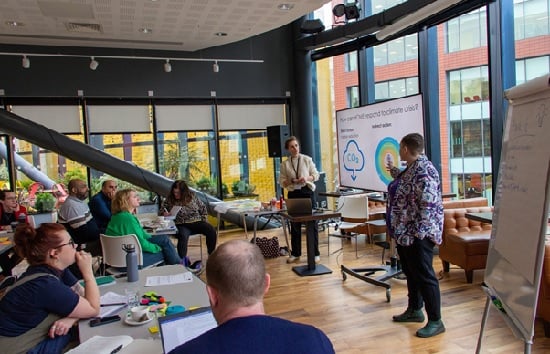
Debbie Bell, right, delivers Carbon Literacy training
Photo: Film Hub North
What can cultural boards learn from climate activism?
From job titles to meeting agendas, Debbie Bell explains why no stone is left unturned in her trustees’ approach to tackling the climate emergency.
The coronavirus crisis has forced governments across the world to take emergency measures to deal with the situation, and brought home to everyone the fragility of the world we live in. Can this moment of heightened awareness also be a spur to take decisive action on the climate emergency?
Governance and activism are both driven by collaboration and a desire for change. Activism comes in many forms. Declaring a public climate emergency proclaims an awareness of the environmental impacts of an organisation’s actions, and the need for urgent change in the face of climate crisis. But moving from awareness to action requires people to start asking (and answering) important questions.
When it comes to environmental sustainability, how many boards are holding crisis meetings or holding their organisations accountable? How many board members know if their organisation has a sustainable travel policy for its staff, and which trustees have been appointed for their knowledge and advocacy of environmental sustainability? Do trustees know their own carbon footprints, or that of their organisation?
In answering these questions and others, organisations and their boards can learn from grassroots movements by giving voice and visibility to the issue, adopting an agile, community-driven approach, and embedding it in all they do. At HOME, our environmental policy and action plan is directly aligned to our strategic business plan. The change was delivered by the commitment of driven HOME team members leading to collaboration with the board over several years.
Thinking you’re doing the best you can is a means of offsetting guilt and glossing over the issue
We’ve embedded a cultural change that ensures sustainability is included in job titles, job descriptions, covered within inductions – including board members' – discussed in both staff and board planning activities, included in meetings, and communicated both internally and externally to our wider networks.
Environmental sustainability is recognised as a collective responsibility, with every individual being skilled and supported to make planet-positive choices in their role and beyond. We know that this approach is imperative to supporting a creative green future for the organisation and the communities that we serve.
As Jonty Claypole, Chair of HOME’s Board of Trustees, says: “This isn’t just about making a few tweaks to historic and unsustainable ways of working, but fundamentally questioning what artistic and cultural practice needs to become if it is to continue to have a central role in a society defined and threatened by the environmental crises it has created.”
Barriers to accountability
Greenwashing is easy. Thinking you’re doing the best you can is a means of offsetting guilt and glossing over the issue. We know that this is an unacceptable means of response in the face of climate emergency. The challenge comes when you scratch beyond the surface so you can accountable for the direct and indirect impacts of your actions.
Choices are tricky, especially within the cultural sector where resources are limited and the expectation of producing and presenting quality, internationally reaching community-engaged programming is ever increasing. Of course there has to be consideration of financial, social and environmental sustainability. But these challenges can be real opportunities for new collaborations, developing existing partnerships and working across sectors to align ambition. For example, if you’re an arts venue championing sustainability to your audiences, are you also working with travel partners to support low and active travel? Your board should be advocating these changes. If it isn’t, ask yourselves these questions: what’s stopping you and at what cost to the planet?
Ensuring environmental sustainability
Grassroots movements are fuelled by information-sharing: knowledge is power. Boards must be aware of the organisation’s environmental business plan, KPIs and strategies. They also need to have the knowledge to drive action. Our programme Carbon Literacy is a great example of this. It ensures boards have the skills and awareness to act in the face of the climate crisis and sends a powerful message that they are ambassadors for driving change. We have developed our own training programme in this area and there are free resources available from DEFRA.
Trustees are active members of the HOME team. In Carbon Literacy terms this ensures our board takes action on direct and indirect carbon emissions reduction by considering their ‘spheres of influence’ – the people they have to power to reach. These include regional and national policy makers, their own businesses, their communities, one another, corporate sponsors and prospective funders, funding bodies, plus a whole network of governance professionals. The board also holds HOME accountable for our sustainability commitments. They reflect back their learning and up the ante to ensure that our efforts continue to be of the highest possible standard, are driven forward with ambition and are aligned to the organisation’s business model, key performance model and goals.
Jonty Claypole says: “As Chair of the Board of Trustees, I work directly with Debbie Bell, ensuring our environmental sustainability policies are reported on in each board meeting. It is a two-way and collaborative process with both Debbie and the board pushing for greater change within our business. We are proud of the fact that HOME is at the forefront of environmental sustainability in the cultural sector but also believe that this is not enough: both the organisation and the cultural sector as a whole still have a long way to go.”
Changing your operations
Organisational structures, like ecosystems, are always evolving, with each member having a vital role to play within the structure. So it’s essential that boards are be dynamic in their thinking and adaptable to the changing environment in which they exist. This is vital to the resilience of the whole organisation and the world in which they belong. Culture change must be embedded across all stages of trustee terms – from recruitment applications to training, to having environmental sustainability as a standing agenda item at all meetings and within reports. The board needs to be empowered to challenge the organisation’s actions and play a role in advancing change. Its members are in a unique position to hold the organisation, policy makers and funders accountable, as well as being positive advocates – celebrating and championing trailblazing leadership.
Trustees can bring the organisation together and lead by example, amplifying calls for action, speaking truth to power and raising ambition. The climate emergency is the unknown, but this can also be an opportunity to create something new and innovative. There are some great frameworks available to hang a strategy or action plan on, from the UN Sustainable Development Goals to Julie’s Bicycle’s Creative Climate Trends and regional or national carbon emissions targets.
Trustees of cultural boards have a lot to think about at the moment, but if you take one thing away from this article, let it be this: act now on the global climate crisis and global pandemic. Learn from the activist movements. Speak out, nail your colours to the mast, upskill, communicate and collaborate for change.
Debbie Bell is Building and Environment Manager at HOME.
![]() homemcr.org
homemcr.org
This article was edited and commissioned by Rowena Price for the Cultural Governance Alliance.
Demonstrate your commitment to good governance – join the Cultural Governance Alliance for free today.
Clore Leadership
Clore Leadership was launched in 2003 by the Clore Duffield Foundation, to support and provide the professional development required to sustain the UK’s great cultural institutions, and international reputation for artistic excellence and innovation.
In the sixteen years since, the programme has succeeded in creating a sought-after cadre of creative and cultural leaders, and inspired investment in leadership on the part of governments, agencies, foundations and charities both nationally and internationally. It was and remains an exemplary intervention in our sector – Clore Leaders, some 2,220 alumni, are thriving and the investment in them is reaping significant rewards.

Join the Discussion
You must be logged in to post a comment.